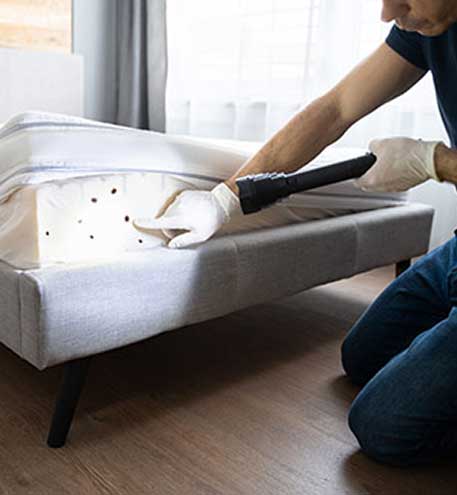Reliable Kings Pest Control Cincinnati Ohio: Trustworthy Solutions
Reliable Kings Pest Control Cincinnati Ohio: Trustworthy Solutions
Blog Article
Types of Bug Control: Which Method Is Right for Your Infestation?
When faced with an insect infestation, the selection of an ideal technique for insect control is vital in successfully handling the circumstance. From chemical treatments to organic options, there exists a variety of techniques that can be employed to resolve various kinds of pests. Each approach includes its own collection of benefits and considerations, making the decision-making procedure a nuanced one. Recognizing the nuances of each approach and reviewing their compatibility with the particular pest problem available is important for attaining long-lasting success in pest administration. By exploring the numerous sorts of parasite control techniques readily available, individuals can make enlightened decisions customized to their distinct conditions, making sure a more lasting and effective result in pest obliteration.
Chemical Pest Control
Chemical insect control includes making use of synthetic or normally acquired chemicals to manage and remove pest populaces effectively. This method is frequently made use of in farming, forestry, and property setups to battle a variety of bugs, consisting of weeds, bugs, and rodents. Using chemical pesticides can supply quick and targeted remedies to pest problems, making it a preferred selection for numerous people and businesses.
One of the key benefits of chemical parasite control is its capacity to promptly get rid of insects, decreasing the danger of damage to plants, building, and human wellness. By making use of certain chemicals that target specific insects, this method can effectively regulate invasions while reducing harm to advantageous microorganisms and the setting when applied correctly.
However, the usage of chemical insect control also elevates worries regarding potential damaging impacts on non-target species, water resources, and human health and wellness. It is essential to follow safety and security guidelines, use chemicals properly, and think about alternative parasite control techniques to minimize these risks and make sure sustainable insect administration practices.
Organic Pest Control
Organic pest control, likewise understood as biocontrol, uses living microorganisms to manage and minimize pest populations normally. By making use of the parasite's natural predators or pathogens, organic insect control provides a sustainable and eco friendly option to pest administration.

Mechanical Insect Control
Using physical and manual methods to handle parasite populations, mechanical pest control uses an alternative strategy that does not count on using living microorganisms or artificial chemicals. This approach involves the use of barriers, traps, or other tools to physically deter or remove pests. By obstructing insect entry factors or setting up catches to catch them, mechanical bug control can effectively reduce infestations without presenting chemicals into the environment.
One common example of mechanical pest control is making use of mesh screens on home windows and doors to prevent bugs from entering buildings. This basic yet effective approach functions as a physical obstacle, keeping bugs out while enabling correct air flow. In addition, devices like mousetraps, fly swatters, and ultrasonic repellents fall under the mechanical insect control category.
While mechanical insect control methods can be labor-intensive and need routine monitoring and maintenance, they provide a sustainable and eco-friendly service for managing bug problems. By combining various mechanical techniques, homeowner can develop a thorough parasite control method that reduces reliance on chemical pesticides.
Physical Pest Control

Some typical physical pest control approaches consist of using obstacles such as nets or screens to stop parasite access, catches to capture and get rid of insects, and hand-picking to physically get rid of pests from plants or structures. In addition, techniques like heat one time termite treatment treatments can be used to control pests like bed pests by elevating the temperature level to degrees that are lethal to the insects.
Physical parasite control is specifically helpful in integrated parasite administration (IPM) techniques, where numerous pest control approaches are integrated for effective parasite administration while lessening using chemicals. By using physical parasite control techniques, individuals can successfully resolve pest infestations with very little ecological impact.
Integrated Insect Administration
When applying physical parasite control methods as part of insect administration techniques, Integrated Bug Monitoring (IPM) becomes a thorough approach that leverages various techniques to efficiently control pest populations. IPM concentrates on long-term prevention of pests through a combination of organic, social, physical, and chemical devices customized to certain bug problems. By integrating wood treatment for termite prevention several control strategies, IPM aims to minimize the risks related to parasites while additionally lowering dependence on chemical options.
One secret aspect of IPM is the emphasis on surveillance and analyzing pest populaces to figure out the most appropriate control approaches. This aggressive technique enables for early treatment and targeted approaches, resulting in much more efficient parasite administration. Additionally, IPM advertises eco-friendly methods by focusing on non-chemical control approaches and just utilizing chemicals as a last option.
Verdict

By making use of the bug's all-natural predators or pathogens, find more information biological parasite control supplies a eco pleasant and sustainable remedy to pest monitoring. - Kings pest control Cincinnati
Utilizing hand-operated and physical techniques to manage parasite populaces, mechanical insect control offers a different technique that does not rely on the usage of living organisms or synthetic chemicals.A reliable method to managing bug populations without counting on chemical or biological methods entails the use of physical parasite control methods.When implementing physical bug control methods as component of insect monitoring techniques, Integrated Pest Administration (IPM) emerges as a detailed approach that leverages numerous techniques to successfully control pest populaces. Chemical pest control includes the usage of pesticides, organic pest control uses all-natural predators, mechanical bug control involves physical barriers, physical parasite control consists of capturing or getting rid of insects, and incorporated pest administration incorporates multiple techniques for an all natural technique to pest control.
Report this page